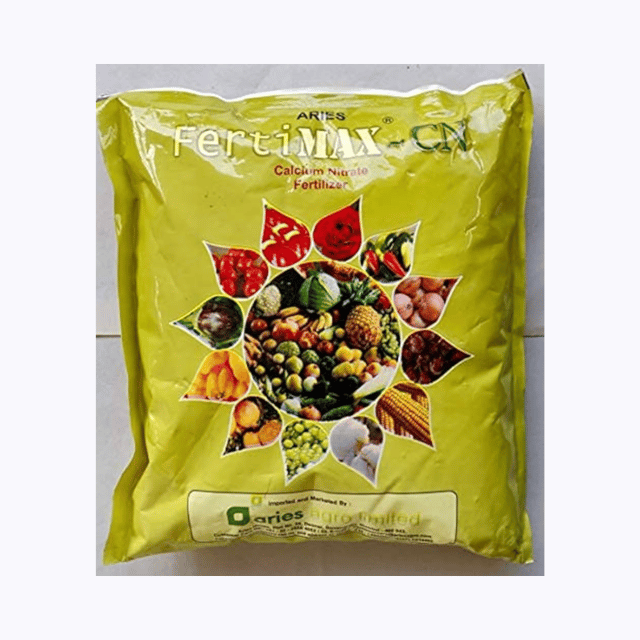Aries Fertimax CN is a premium-grade calcium nitrate powder fertilizer designed to supply essential nitrate nitrogen and calcium in a fully water-soluble form. It supports robust root growth, cell wall development, and improved fruit firmness across a wide range of crops.
Its nitrate-based nitrogen ensures immediate availability, while high calcium content reduces physiological disorders like blossom end rot in tomatoes and bitter pit in apples. Ideal for foliar sprays and fertigation systems.
Key Benefits
- ✔ 15.5% Total Nitrogen: Includes 14.5% readily available nitrate nitrogen
- ✔ 18.5% Water-Soluble Calcium: Improves cell wall strength and fruit quality
- ✔ Fast Nutrient Uptake: Ideal for quick correction of nitrogen and calcium deficiencies
- ✔ Low Insoluble Matter (≤ 1.5%): Ensures clog-free application in drip and foliar systems
- ✔ Prevents Disorders: Controls blossom end rot, bitter pit, and leaf spot in calcium-deficient crops
Composition
| Component | Percentage by Weight |
|---|
| Total Nitrogen (Ammoniacal + Nitrate) | 15.5% |
| Nitrate Nitrogen (as N) | 14.5% |
| Water Soluble Calcium (as Ca) | 18.5% |
| Water-Insoluble Matter | ≤ 1.5% |
Usage Guidelines
- Recommended Dose: 4 gm per liter of water
- Application Interval: Twice at 10-day intervals after 1 month of transplanting
- Method: Use via foliar spray or fertigation for best results
- Precaution: Avoid mixing with phosphate or sulfate-based fertilizers
Suitable For
- ✔ Vegetables – Tomato, Chilli, Brinjal, Cucumber
- ✔ Fruits – Banana, Apple, Citrus, Grapes
- ✔ Plantation Crops – Tea, Coffee, Cocoa
- ✔ Ornamental & Floriculture – Marigold, Rose, Gerbera
- ✔ Field Crops – Cotton, Sugarcane, Pulses
Storage & Handling Instructions
- Store in a cool, dry place, away from moisture and direct sunlight
- Seal pack tightly after every use to prevent clumping
- Wear gloves and mask while handling for safety
- Keep away from children, animals, and food materials
Disclaimer: Always read product label and follow dosage as per crop requirements. For maximum benefit, consult an agronomist based on soil conditions and crop type.
